Ceremony honors teaching 'powerhouse,' UMMC educators
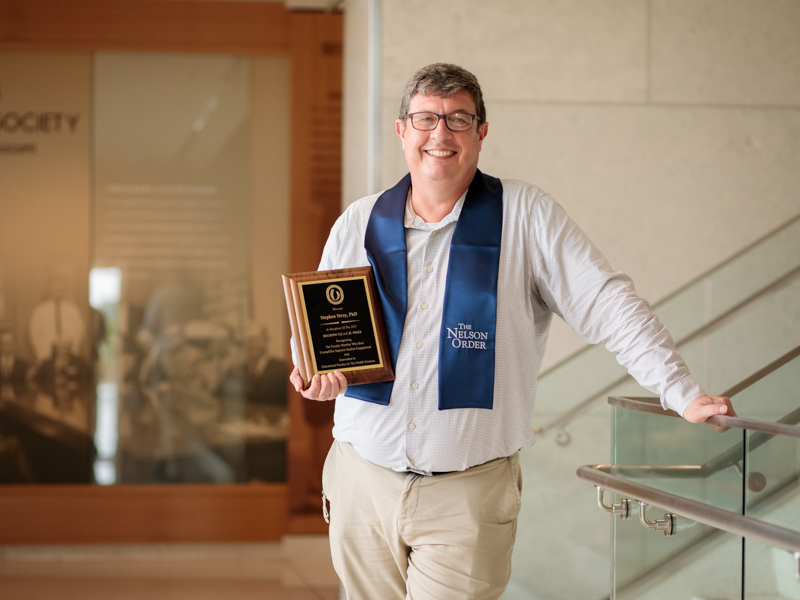
A “saint.” A “gem.” A “true powerhouse in the profession of teaching.”
That’s a bit of praise University of Mississippi Medical Center students have heaped onto Dr. Stephen Stray, associate professor of microbiology and immunology. Now, he can add one more descriptor: 2021 Regions TEACH Prize winner.
Since 2013, the annual Regions TEACH, short for Toward Educational Advancement in Care and Health, Prize has recognized one faculty member with a $10,000 award and the knowledge that students had a say in selecting the person deemed the year’s most outstanding educator at UMMC. The award is presented in conjunction with the annual induction ceremony for the Nelson Order, which recognizes the Medical Center’s best teachers. This year’s ceremony took place Monday, May 10 in the School of Medicine and via livestream.
“It’s a genuine honor to be named alongside people I value as colleagues and as friends, and when I think about the people who have been selected [for the TEACH Prize] before, it’s strange to me that people think I’m on the same level as these folks,” Stray said.
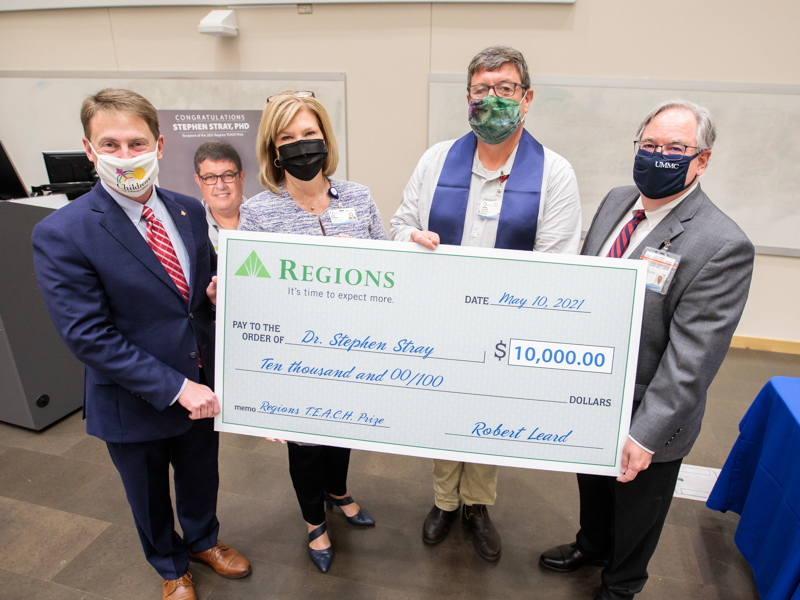
It’s not a surprise for the students in the Schools of Graduate Studies in the Health Sciences and Medicine, who put his name forward for the honor. A six-time Nelson Order inductee, Stray directs the first year doctoral-level Microbiology and Immunology course, in addition to the equivalent courses in the Schools of Medicine and Dentistry.
Dr. Ellen Robertson, assistant professor of neurobiology and anatomical sciences, wrote in her recommendation letter that Stray might be underselling his skill.
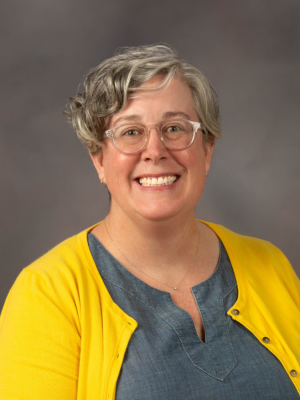
“In many ways he is far too humble in regards to his teaching ability and insights,” wrote Robertson, who had Stray as a member of the dissertation committee as a PhD student in clinical anatomy. “He is engaged, and a leader, on campus in promoting student learning through active sessions.”
Whether he is in a lecture hall or a laboratory, Stray sees himself as a guide and encourager for his students.
“People sometimes need convincing that they know the material, and I want to be a cheerleader for them, because I know they can do it,” Stray said. “One of the most rewarding experiences is when there’s a student who is having a hard time with the material, and then I witness the moment the penny drops, when they see the implications and learn how to apply the knowledge. That’s an incredible feeling.”
Stray says he’s had too many cheerleaders of his own to name, including colleagues at UMMC, high-school instructors and his parents. However, only one elementary teacher makes the list: Tony Sestito, the leader of the one-room school Stray attended in rural Australia.
“There were about 24 of us, from 4 years old through sixth grade. One teacher basically covered everything and managed to do it in an age-appropriate manner for each student. It was astounding,” Stray said. “He opened the doors to a wide world of knowledge [in a place where] many of the students and their parents hadn’t ever gone more than 100 miles from their home.”
This experience, along with his parents and grandparents’ love of learning, helped encourage Stray’s desire to become a teacher. He studied biochemistry at the University of Melbourne before earning a PhD in microbiology at the University of Alabama-Birmingham. His research there focused on how influenza viruses infect cells and replicate. After a postdoctoral fellowship at the University of Oklahoma Health Sciences Center studying hepatitis B viruses, he joined the UMMC faculty in 2006.
,
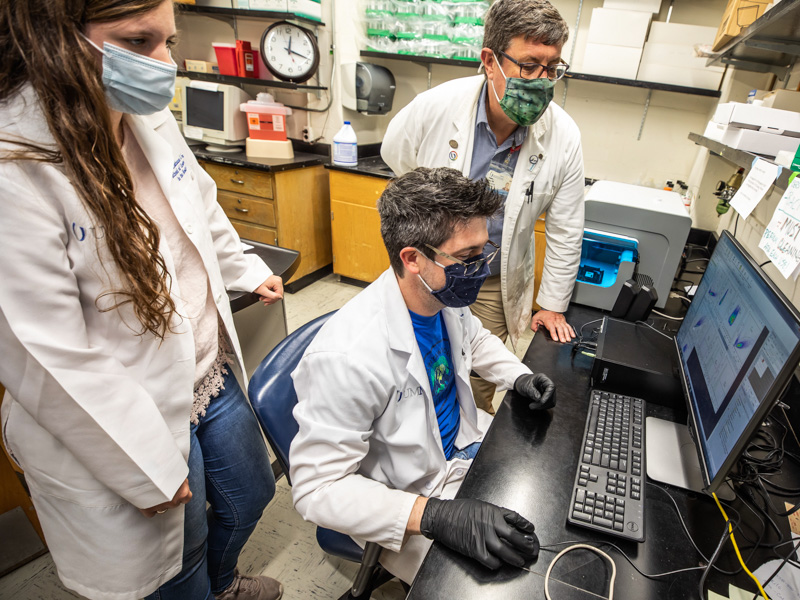
Today, Stray brings an infectious enthusiasm to the classroom.
“I’m quite lucky that I teach in the areas where I’m most interested,” he said. “I enjoy teaching about viruses, the cool things they can do and the tools we come up with to combat them.”
He teaches what medical students need to know for board exams, but also ensures they learn about cutting-edge advances that will benefit their patients in the clinic. For instance, Stray introduces students to new and emerging drug treatments for viral infections such as hepatitis B and hepatitis C.
“Students might say, ‘that’s not on the test.’ But, you may prescribe this to patients during your clinical rotations or as an intern, and that makes it valuable knowledge to have,” he said.
Stray has seen an uptick in student interest in virology, as well as an opportunity to add coronaviruses to the usual influenza and hepatitis-linked examples he uses in class. Even before the pandemic, Stray had, “at least three ways to approach any topic” – some of his own creation, others borrowed from colleagues.
“If something works, I’ll steal it,” Stray said.
Choosing the right techniques comes down to discovering the students’ learning styles, whether through direct communication or reading the room.
“I like having an audience because I can see student’s faces,” he said. A single furrowed brow in the crowd signals one person might need extra help, “but if 25 percent of the class looks lost, then I know I have to go back and try again.”
“He was so intuitive about which parts of the lab we were either struggling with or not completing with confidence and stepped in to teach us about them,” one student wrote in an evaluation. “Without fail, when he stepped over to show us something or ‘remind’ us about a detail it was something we didn't know or actually needed help with but just hadn't asked about yet.”
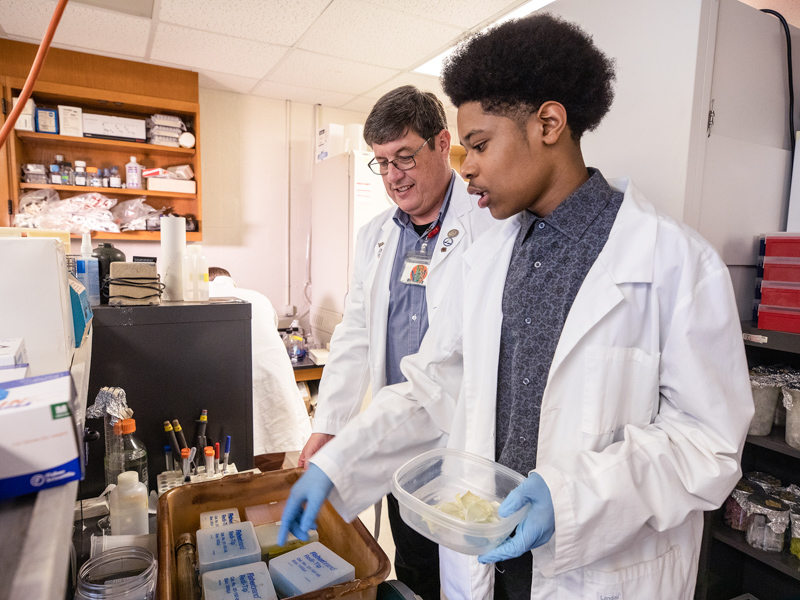
Stray also uses his laboratory as an active-learning space for students in research experience programs, most notably Base Pair, Murrah High School’s decades-long mentoring partnership with UMMC.
“Base Pair really has made a big difference in a lot of lives,” Stray said in 2019. “We've had students who've come through this program who are now practicing as dentists and as physicians and doing other things that they may have never even considered as career opportunities because they got this exposure."
Stray and his students pursue a variety of projects clustered around virus evolution and the potential of virus-inspired particles as anti-cancer therapeutics.
“Viruses are exquisitely evolved to deliver cargo to specific cells. Most viruses are adapted to recognize very specific cell types by binding to a single or limited range of cell surface receptors,” Stray writes of his research interests. “We wish to enhance this toolbox for physicians to use by identifying additional viruses that may be useful in targeting glioblastoma and other cancer cells.”
While the COVID-19 pandemic limited possibilities for students to work physically in the laboratory, Stray found a way to incorporate the virus into an existing research module.
“This year, the Base Pair students are using a molecular modelling freeware program to look at the variants of SARS-CoV-2 that have emerged in the United Kingdom, South Africa and other places. We’re able to look at the structure of their spike proteins and their mutations to learn what we can say about their potential effects,” Stray said.
Dr. Donna Sullivan, professor of medicine and long-time Base Pair co-director, wrote that Stray is of the program’s most valuable advisors.
“He is highly sought after as a mentor and many of them have volunteered their summers in Dr. Stray’s lab. Clearly, his love of research and excitement for science transfers to his students. Indeed, many continue to seek his counsel in their college careers,” she said.
“If there’s one thing I hope I can model, it’s that I can pass on my love of learning to my students and make it about them,” Stray said “In turn, I’m hoping that this will pay forward to the next generation of researchers, educators, and practitioners who will be centered on the needs of their own students and patients.”
2021 Regions TEACH Prize Finalists/Nelson Order Inductees
Amanda Capino, PharmD; clinical assistant professor of pharmacy practice; School of Pharmacy
Elizabeth Franklin, PhD; associate professor of health administration; School of Health Related Professions
Kenneth Holm, BS; instructor of data science; School of Population Health
Yuefeng Lu, MD, PhD; associate professor of neurobiology and anatomical sciences; School of Dentistry
Anne Norwood, PhD, RN, FNP-BC, professor of nursing; School of Nursing
Stephen Stray, PhD; associate professor of microbiology & immunology; School of Graduate Studies in Health Sciences; School of Medicine (students from both schools selected Stray)
Lyssa Weatherly, MD; assistant professor of medicine, assistant dean of student affairs; School of Medicine
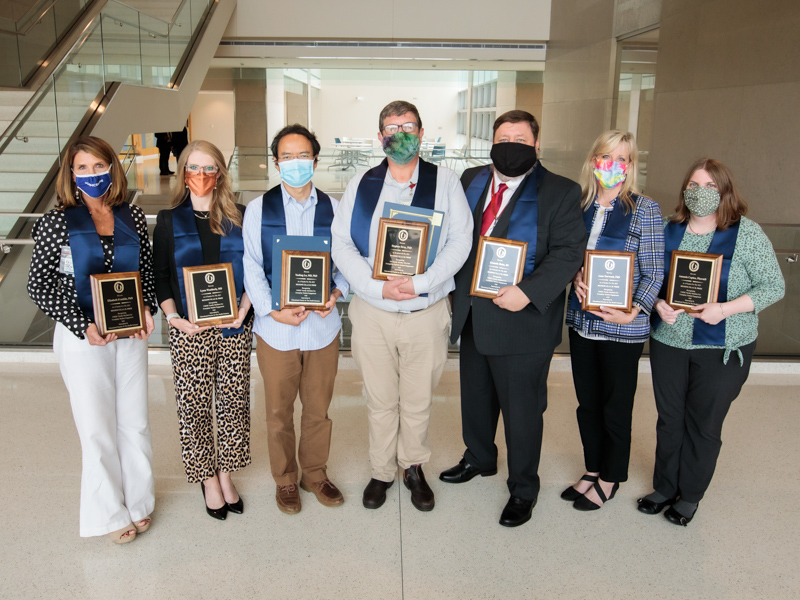
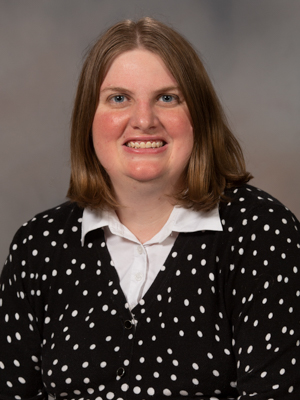
Amanda Capino, PharmD; clinical assistant professor of pharmacy practice; School of Pharmacy
Since 2016, Capino has been a member of the School of Pharmacy faculty at the Medical Center, where she is also a clinical pharmacy specialist in the Neonatal Intensive Care Unit at the Wiser Hospital for Women and Infants.
“Although there are sad outcomes in the NICU, there are also miracles,” Capino said during an interview two years ago.
“There have been times when I didn’t know if a patient would make it, but then several months later, I had tears in my eyes as parents were able to take their baby home for the first time after a very long stay in the NICU.”
Among her many honors are the P3 Teaching Team of the Year (team member), awarded in April; and the Scholarship in Teaching Award from the Pediatric Pharmacy Association in April 2019.
She earned her Doctor of Pharmacy degree at the University of South Carolina in Columbia in 2014, and did her pharmacy residency training at the University of Oklahoma in Oklahoma City.
Her teaching pursuits include serving as a preceptor to students in the NICU who are interested in a residency/career in pediatric pharmacy.
Upon hearing of her selection as a TEACH Prize finalist, she wrote: “I absolutely love teaching and am so fortunate to be able to combine my passions of teaching and pharmacy into what I do on a regular basis.
“While this year encompassed many challenges due to the pandemic, my ultimate goals of teaching and mentoring pharmacy students and assisting students in achieving their goals did not change.”
______________
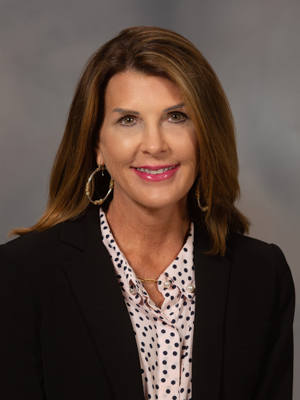
Elizabeth Franklin, PhD; associate professor of health administration; School of Health Related Professions
Franklin, who joined the Medical Center in 2012, is a member of the SHRP faculty in the Doctor of Health Administration Program. She also helps create and launch campus-wide development opportunities for faculty, students and staff from all schools on campus.
As a TEACH Prize finalist, she submitted a statement of her teaching philosophy, which included this anecdote: “Years ago, when he was in high school, my older son [Dr. John Franklin, School of Medicine Class of 2020] was asked by an acquaintance, ‘What’s it like to have your mom as a teacher?’ He replied, ‘I don’t have a mom who is my teacher; I have a teacher who is my mom.’”
In spite her “mom guilt” at hearing that, Franklin wrote that her son was right. “The wonder of teaching and learning has always been an integral part of who I am.”
She earned her BA in English, cum laude, at the University of Southern Mississippi Honors College in 1984 and her M.Ed. in secondary education at the University of Mississippi and Universidad de Salamanca in Spain six years later. Her PhD in higher education leadership is also from the University of Mississippi.
Among her honors are the 2020 Distinguished Member award from the Alliance for Continuing Education in the Health Professions, and the U.S. Presidential Scholar Distinguished Teacher, 2010, from the U.S. Department of Education.
“I have learned patience, integrity as a faculty member and leader,” she wrote, “compassion for my students and colleagues, and a respect for those who mentored me, gave me second chances, and protected me from failure.”
______________
Kenneth Holm III, BS; instructor of data science; School of Population Health
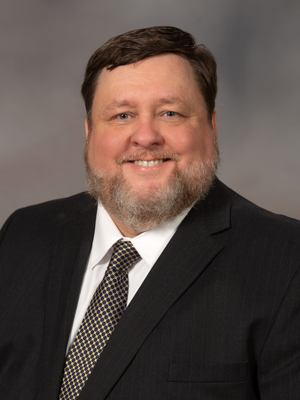
Holm, who develops software for desktops, servers, the Web, as well as for mobile devices, has been with the Medical Center for a total of more than 10 years. He also gives technology-related training to other teams in the Department of Information Systems.
He was 12 when he had his first experience with programming, in 1982, with one of world’s first home computers, the TI-99/4A. He connected it to the antenna screws on the back of a black-and-white TV set – and he, too, was hooked.
After a six-year stint in the U.S. Marine Corps as a Korean cryptologic-linguist and a light-armored vehicle crewman, until July 1995, he began developing his career as a programmer.
He eventually worked at the Medical Center as a Unix System administrator for about three-and-a-half years, until January 2008 before joining the Mississippi Development Authority as lead programmer/analyst for more than five-and-a-half years.
Holm, who graduated with his bachelor’s degree in interdisciplinary studies at Mississippi State University in April 2011, returned to the Medical Center in August 2013.
“Being able to program is empowering in so many ways,” he said, in the statement of his teaching philosophy.
“The love that I have for programming is something I hope comes across as I teach. When a student finishes my class, that student will have pulled back the curtain of magic that programming seems to hide behind.”
______________
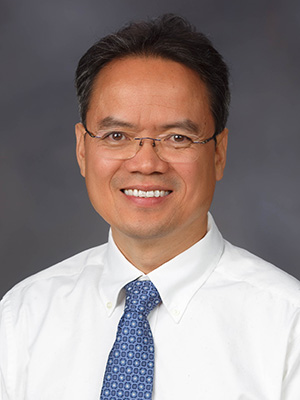
Yuefeng Lu, MD, PhD; associate professor of neurobiology and anatomical sciences; School of Dentistry
Lu, who moved to Mississippi from China in 2000, graduated with a PhD in anatomy at UMMC in 2008, after earning his MD from Henan Medical University in Henan, China, in 1996.
He has served as an assistant professor at Tougaloo College in Jackson and as a lecturer at the Beijing Medical University School of Medicine in China.
At the Medical Center, he is a four-time winner of the Carl G. Evers Basic Science Professor of the Year Award for Teaching Excellence, School of Medicine; and a three-time winner of the Hembree Honor Society Award for Excellence in Teaching Basic Science, Professor of the Year, School of Dentistry. He has won numerous other teaching awards for course instruction in Gross Anatomy.
He joined the medical center as assistant professor in August 2011 and became associate professor eight years later.
“My story begins with a quote from Albert Einstein: ‘If you can’t explain it simply, you don’t understand it well enough,’” he wrote in stating his teaching philosophy.
“This statement underlies all my instructional sessions. While teaching, I make conscious decisions to simplify the complexities of Gross Anatomy and provide straightforward and easy to follow explanations.”
______________
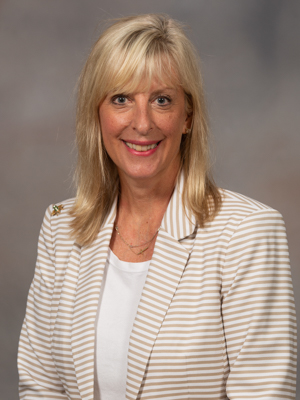
Anne Norwood, PhD, RN, FNP-BC, professor of nursing; School of Nursing
Norwood is a four-time recipient of the Nelson Order for Teaching Excellence Award.
She is also the associate dean of practice and partnerships, and assistant dean of graduate programs, interim. For more than a decade, until this year, she was director of Jackson School-Based Clinics
This academic year, she was nominated for the DAISY Faculty Award, contributions faculty make to the future of nursing, including their impact on students and, in consequence, patients.
Norwood received her PhD in clinical health sciences at UMMC, SHRP, in 2007; her Master of Science in Nursing at Delta State University in 1997; her BS in nursing at DSU in 1991; and her BS in 1987 from the University of Mississippi.
She was an instructor in the School of Nursing on the Grenada campus of Holmes Community College for about seven years before joining the Medical Center, in 2001.
In her nomination letter for the TEACH Prize, she wrote of her “true love for what I do every single day… .
“I can only hope that I can continue to empower and inspire those I teach so they may have an influence on others.”
______________
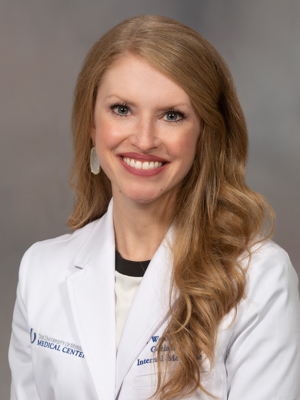
Lyssa Weatherly, MD; assistant professor of medicine, internal medicine and geriatrics; assistant dean of student affairs, School of Medicine
This is Weatherly’s second time to be recognized as an inductee into the Nelson Order for Teaching Excellence.
Among her many previous honors: 2019 Clinical Professor of the Year, School of Medicine; and 2019 Teacher of the Year, Internal Medicine. She is a member of the Carl G. Evers Society Teaching Hall of Fame.
Weatherly is also associate program director of the Internal Medicine Residency Program at UMMC.
“The opportunity to teach and mentor students both in the classroom and at the bedside is priceless,” she wrote in her TEACH Prize nomination letter.
Weatherly received her BS at Mississippi College before graduating from the School of Medicine at UMMC in 2012. She finished her internal medicine residency at UMMC in 2015; two years later, she completed a fellowship in geriatrics at the Medical Center.
“To even be considered in the ranks of Drs. Lu, Franklin, Norwood, Capino, Holm, and Stray is just an honor itself,” she wrote.
“These are some of the best educators I know, some of which even taught me when I was a student. When I reflect on the finalists of the past few years, they are some of my greatest mentors.
“Being listed in this group is a gift all its own. Thank you for this honor from the bottom of my heart.”


